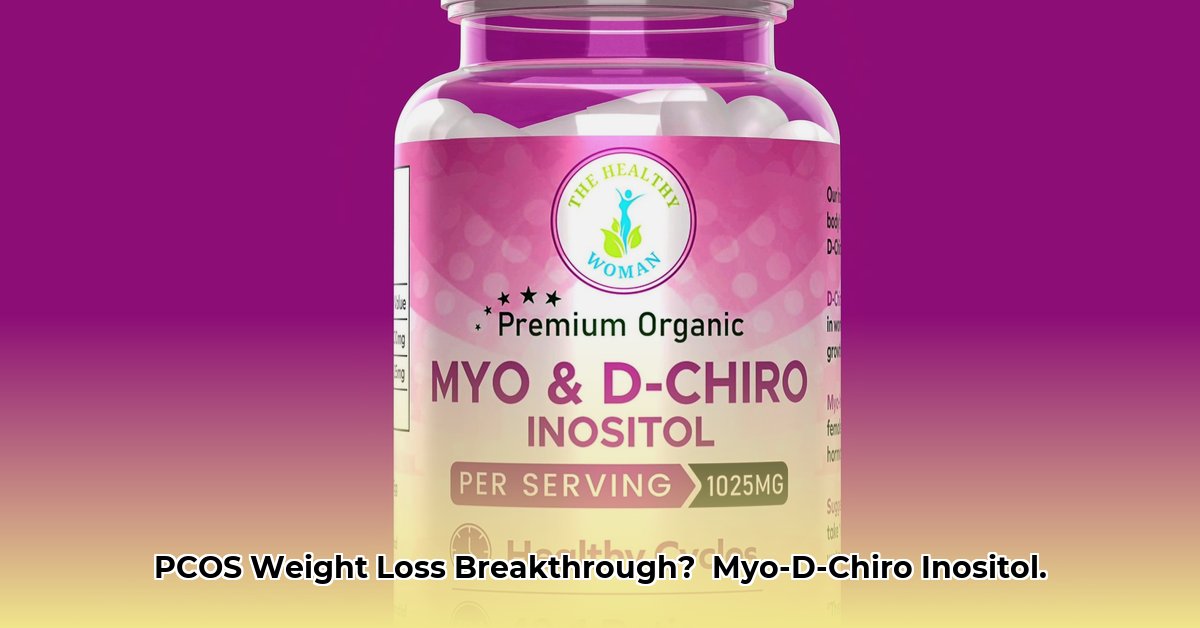
Understanding Myo-Inositol and D-Chiro-Inositol for Weight Loss
Are you struggling with weight loss, particularly if you have Polycystic Ovary Syndrome (PCOS)? Myo-inositol (MI) and D-chiro-inositol (DCI) are two forms of inositol that have shown promise in aiding weight management, especially for individuals with insulin resistance, a common characteristic of PCOS. These natural compounds may improve how your body utilizes insulin, potentially leading to more efficient sugar processing and reduced fat storage. However, it's crucial to understand that inositol isn't a magic bullet; its effectiveness varies, and more research is needed to fully determine its impact.
Could improved insulin sensitivity be the key to unlocking your weight loss goals? Several studies suggest that MI and DCI may help enhance this process, but individual results can differ significantly. This highlights the importance of a personalized approach, guided by healthcare professionals familiar with your specific circumstances.
Who Might Benefit Most from Inositol Supplementation?
While MI and DCI may assist various individuals in weight loss, certain groups appear to experience more significant benefits. Individuals with PCOS or insulin resistance (often diagnosed through measuring insulin resistance and/or HbA1c levels), or those already facing challenges with weight management, frequently see noticeable positive changes. Some studies suggest age might also be a factor, with potentially greater efficacy observed in individuals over 40. This suggests a tailored approach is essential, recognizing that the effectiveness of inositol can depend on individual factors. Think of it as employing the right tool for the right job.
Dosage and Usage Guidelines: A Practical Approach
Determining the optimal inositol dosage remains a challenge; there's no universally accepted recommendation. Typical guidelines suggest 1000-2000 mg of MI daily for general weight management, sometimes increasing to 2000-4000 mg for individuals with PCOS. The ideal MI to DCI ratio is also under ongoing investigation; some experts favor a 40:1 ratio, mirroring natural bodily levels.
Does combining inositol with lifestyle changes enhance its effectiveness? The evidence suggests a resounding "yes." Integrating inositol as part of a comprehensive strategy that includes a healthy diet and regular exercise may maximize its potential benefits. Consistency is key; the cumulative effect of combining these approaches is likely superior to using inositol alone.
Potential Side Effects and Precautions: A Safety First Approach
Like many supplements, inositol can cause side effects. The most commonly reported are mild gastrointestinal issues such as nausea, diarrhea, or bloating. In rare cases, low blood sugar (hypoglycemia) may occur, posing a particular concern for those with diabetes or individuals already taking medications that might interact. Consulting your doctor before initiating inositol supplementation is crucial, especially if you have an existing health condition.
A Step-by-Step Guide to Inositol for Weight Loss
Here's a structured approach to incorporating MI and DCI safely and effectively into your weight loss journey:
Consult your doctor: Discuss inositol supplementation with your healthcare provider before starting, particularly if you have pre-existing conditions or are taking other medications. They can assess its suitability for your situation and address potential interactions.
Determine the correct dosage: Your doctor will help you determine the appropriate inositol dosage based on your individual needs and goals. Do not self-prescribe.
Prioritize lifestyle changes: Remember, inositol is a supplementary tool, not a replacement for healthy habits. Maintaining a balanced diet and consistent, appropriate exercise remain crucial for effective and lasting weight management.
Monitor your progress and side effects: Keep track of how you feel while using inositol, noting any potential side effects, no matter how minor. Regular monitoring will help guide adjustments, if necessary.
Embrace a sustainable approach: Weight loss is a journey, not a quick fix. Approach inositol as part of a sustainable long-term lifestyle change, focusing on consistent healthy habits rather than viewing it as a standalone solution.
Ongoing Research and Regulatory Landscape
Further research is necessary to comprehensively understand MI and DCI’s impact on weight loss. While early studies show promise, more substantial evidence, particularly from large-scale, long-term studies, is needed to draw definitive conclusions. The regulatory landscape for dietary supplements is also subject to change, reinforcing the importance of staying informed.
Myo-D-Chiro Inositol for Weight Loss: A Quick Reference
| Factor | Details |
|---|---|
| Possible Benefits | Improved insulin sensitivity; potential aid in weight loss, particularly with PCOS |
| Dosage Recommendations | Variable; always consult your doctor for personalized guidance. |
| Best Results | Likely seen in conjunction with a healthy diet and regular exercise program. |
| Possible Side Effects | Commonly mild gastrointestinal issues; rarely, low blood sugar. |
| Regulatory Status in the US | Regulated as a dietary supplement. |
| Current Research Status | Ongoing; further research required to fully validate benefits. |
Remember, MI and DCI should be part of a holistic approach to well-being and weight management. They are not a shortcut. Always consult your doctor before starting any new supplementation regime.